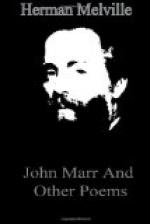Some of us are concerned because as yet the South shows no penitence. But what exactly do we mean by this? Since down to the close of the war she never confessed any for braving it, the only penitence now left her is that which springs solely from the sense of discomfiture; and since this evidently would be a contrition hypocritical, it would be unworthy in us to demand it. Certain it is that penitence, in the sense of voluntary humiliation, will never be displayed. Nor does this afford just ground for unreserved condemnation. It is enough, for all practical purposes, if the South have been taught by the terrors of civil war to feel that Secession, like Slavery, is against Destiny; that both now lie buried in one grave; that her fate is linked with ours; and that together we comprise the Nation.
The clouds of heroes who battled for the Union it is needless to eulogize here. But how of the soldiers on the other side? And when of a free community we name the soldiers, we thereby name the people. It was in subserviency to the slave-interest that Secession was plotted; but it was under the plea, plausibly urged, that certain inestimable rights guaranteed by the Constitution were directly menaced, that the people of the South were cajoled into revolution. Through the arts of the conspirators and the perversity of fortune, the most sensitive love of liberty was entrapped into the support of a war whose implied end was the erecting in our advanced century of an Anglo-American empire based upon the systematic degradation of man.
Spite this clinging reproach, however, signal military virtues and achievements have conferred upon the Confederate arms historic fame, and upon certain of the commanders a renown extending beyond the sea—a renown which we of the North could not suppress, even if we would. In personal character, also, not a few of the military leaders of the South enforce forbearance; the memory of others the North refrains from disparaging; and some, with more or less of reluctance, she can respect. Posterity, sympathizing with our convictions, but removed from our passions, may perhaps go farther here. If George IV could, out of the graceful instinct of a gentleman, raise an honorable monument in the great fane of Christendom over the remains of the enemy of his dynasty, Charles Edward, the invader of England and victor in the rout of Preston Pans—upon whose head the king’s ancestor but one reign removed had set a price—is it probable that the granchildren of General Grant will pursue with rancor, or slur by sour neglect, the memory of Stonewall Jackson?
But the South herself is not wanting in recent histories and biographies which record the deeds of her chieftains—writings freely published at the North by loyal houses, widely read here, and with a deep though saddened interest. By students of the war such works are hailed as welcome accessories, and tending to the completeness of the record.




